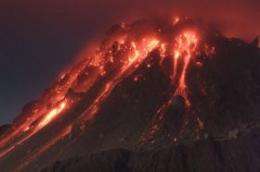Oxidized lava may help explain Earth's evolution

(AP) -- Material from volcanoes where the Earth's plates squeeze together is more oxidized than in regions where the seafloor splits apart, a finding that helps shed light on some of the basic processes in the planet's mantle.
Using highly sensitive X-ray techniques researchers were able to measure the amount of reaction with oxygen that had occurred in minerals in various situations.
Oxidation, best known as rust when it affects metals, was low in materials erupting from mid-ocean ridges where the seafloor spreads apart, Katherine A. Kelley of the University of Rhode Island and Elizabeth Cottrell of the Smithsonian's National Museum of Natural History report in Friday's edition of the journal Science.
But higher rates were found in lava produced by arc volcanoes, which occur in areas where the Earth's tectonic plates collide, with one sliding below another, they found.
"The seafloor is kind of like a rust conveyor belt," Cottrell said in a telephone interview. As material moves over millions of years from the mid-ocean ridges to the subduction zones it becomes increasingly oxidized.
This indicates that what happens on the Earth's surface influences what goes on beneath, Cottrell said, and things that are happening in geology today probably have also done so in the past.
"This is a step in looking at the long-term evolution of the planet," she said.
The finding firmly establishes that subduction oxidizes the source of magma for arc volcanoes, "but the long-term consequences for the evolution of Earth remain poorly understood," commented Marc M. Hirschmann of the University of Minnesota, who was not part of the research team.
The researchers made their calculations by studying water trapped in tiny particles, Cottrell said, but that doesn't mean that the ocean water is causing the oxidation. While water causes rust in the atmosphere it is much less effective at doing that under high pressure such as on the seafloor.
The research was supported by the National Science Foundation and the Department of Energy.
---
On the net:
Science: http://www.sciencemag.org
©2009 The Associated Press. All rights reserved. This material may not be published, broadcast, rewritten or redistributed.



















